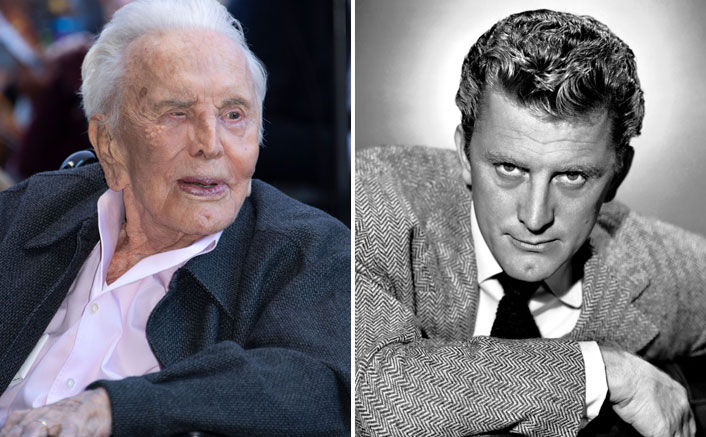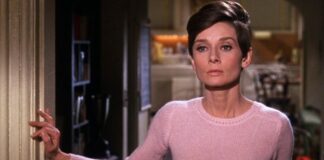Kirk Douglas, the last of the giants who ruled Hollywood’s Golden Age, and starred in iconic films like “Spartacus” besides being the greatest ladies man in Tinseltown, has died, his family has announced. He was 103.
“It is with tremendous sadness that my brothers and I announce that Kirk Douglas left us today at the age of 103,” his son, Michael Douglas, said in a statement posted on Facebook on Wednesday.
“To the world, he was a legend, an actor from the golden age of movies who lived well into his golden years, a humanitarian whose commitment to justice and the causes he believed in set a standard for all of us to aspire to,” it further said.

Propelled by a powerhouse work ethic and strikingly handsome features, Kirk Douglas rose from the poorhouse to Hollywood royalty while starring in some 90 films and TV series over some 60 years – including career-defining roles as the sword-swinging gladiator in “Spartacus” and the tortured artist Vincent van Gogh in “Lust for Life.”
Along the way, the notorious flirt bedded a bevy of Hollywood beauties — and sired a showbiz dynasty with four sons, including famed actor Michael Douglas, reported pagesix.com.
Many wouldn’t know though that before being the Kirk Douglas of marble-chiselled features, he was Issur Danielovitch — the son of dirt-poor Russian-Jewish immigrants born outside Albany in 1916.
Douglas’ father was a peddler whose station was one rung below the bottom of the social ladder — and Douglas’ life was defined by his desire to break out of the poverty and earn his father’s approval.
Douglas passed out from the American Academy of Dramatic Arts. He attended the St. Lawrence University where he wrestled and buffed up his physique.
He got into the liberal arts school after hitchhiking to the campus as a teen and convincing the dean to approve a student loan.
After graduating, he lent his talents to a few minor Broadway productions, but he pushed pause on his acting career to join the Navy in 1941.
Trending
Serving on a sub-hunting ship in the Pacific before he was medically discharged in 1944 for injuries after his own crew accidentally set off a depth charge too close to their ship.
Though Kirk Douglas never got to battle Hitler in the European theatre, he found other ways to combat anti-Semitism.
Pagesix says, Douglas once bedded a woman he knew to be an anti-Semite, just so he could shout, at the climactic moment: “I’m a Jew! You are being f–d by a Jew!” according to his kiss-and-tell 1988 autobiography “The Ragman’s Son”.
In 1943, Douglas wedded actress Diana Dill and the couple produced two sons before their 1951 split: they grew up to be actor Michael Douglas and producer Joel.
After his discharge from Navy, in 1944, Kirk Douglas landed his first big-screen gig opposite Barbara Stanwyck in 1946’s “The Strange Love of Martha Ivers” a role that required the healthy-living thespian smoke cigarettes.
He delivered his breakthrough performance as a pugilist Midge Kelly in 1949’s “Champion” — the role that earned him his first of three Academy Award nominations for the Best Actor.
Some of his top roles came when he teamed up with a little-known director named Stanley Kubrick for 1957’s “Paths of Glory” and 1960’s “Spartacus”.
He threw himself into his many roles with relish, acting with an intensity that often spilled over into his private life. And he had a fine contempt for the Hollywood studio establishment, something that may well have made his career less successful than it was, said the BBC in its obituary.
Several of his most famous roles were as villains, such as the ruthless journalist in “Ace In The Hole” in 1951, who refuses to let sentiment or morality get in the way of a good story.
He won critical acclaim for his portrayal of Vincent van Gogh in “Lust for Life” in 1956, but his own lust for power earned him many enemies.
One of his more notable roles of this period was as Colonel Dax, the commander of a French regiment on the Western Front in the Stanley Kubrick film, “Paths of Glory”. Based on a real-life incident, Douglas is called upon to defend three soldiers charged with mutiny, who are eventually shot. Douglas resisted attempts by Kubrick to change the ending and reprieve the men.
Douglas set up his own production Byrna in a bid to escape the grip of the big studios, which hired and fired at whim. He also defied the anti-communist witch-hunts of the McCarthy era by openly hiring a blacklisted writer, Dalton Trumbo, to script “Spartacus”.
Douglas faded from the big screen in the 1970s but in his later years made a fairly successful comeback in films such as “Tough Guys” with Burt Lancaster and “Greedy” with Michael J. Fox.
His energy did not flag as he grew older. He became a director, producer and novelist.
Douglas served four US presidents in the role of special ambassador, and in 1981 received the Presidential Medal of Freedom.
He also created a charitable foundation and donated more than $1m to the Motion Picture and Television Fund.
His autobiography, “The Ragman’s Son”, made the New York Times best-seller list.
Douglas also wrote two novels, “Dance with the Devil” and “The Secret”.
Douglas, who was given a lifetime achievement award from the American Film Institute in 1991, suffered a stroke in March 1996 which paralysed one side of his face. But despite the stroke affecting his ability to speak, he was able to give the acceptance speech at the 1996 Academy Awards when he received a special award for “50 years as a moral and creative force in the motion picture community”.



 Follow Us
Follow Us




